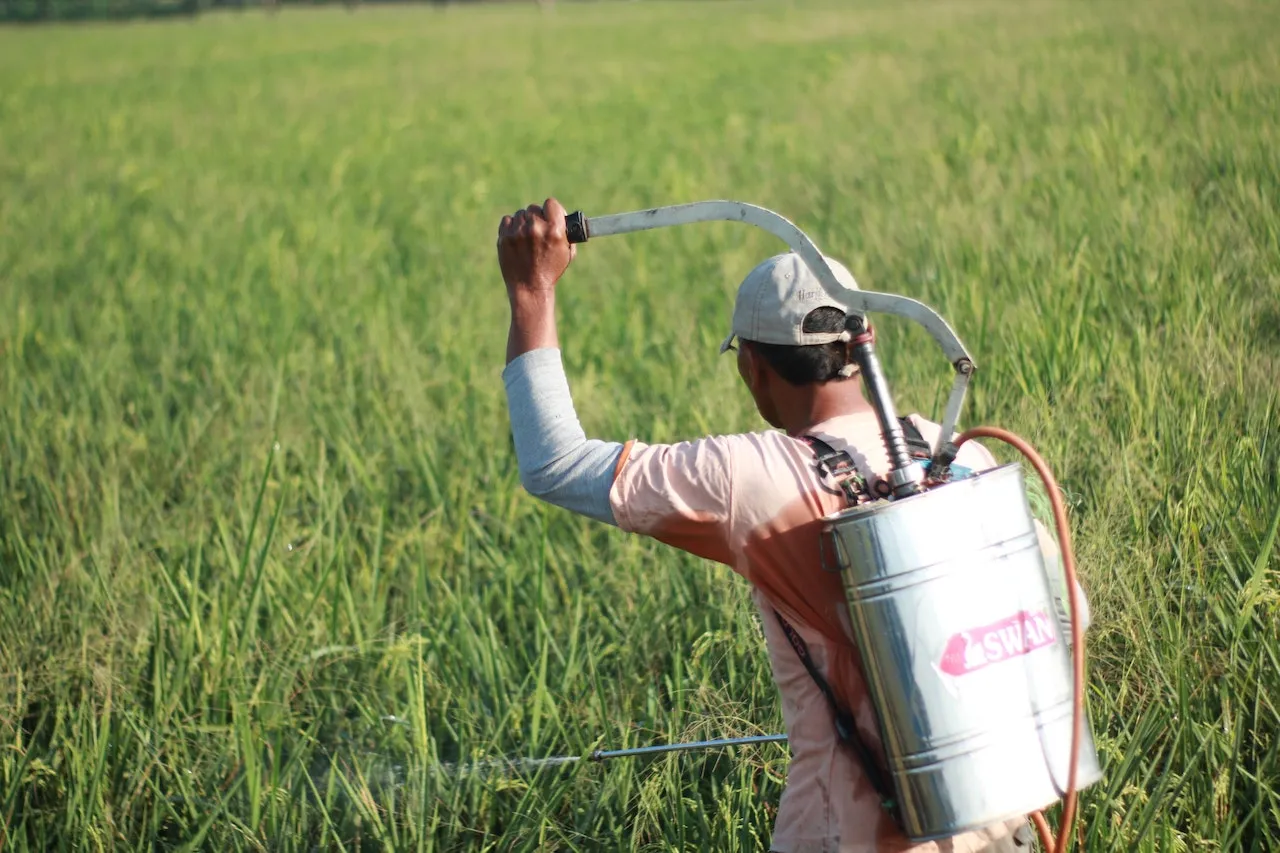Organic pesticides, which use natural ingredients to manage pests and protect crops, are an alternative to artificial chemical pesticides. They are proved to be less harmful to the environment and human health than typical chemical insecticides. Organic insecticides are regarded as safer and more nature friendly alternative in comparison to conventional artificial chemical pesticides. In this article, we will discuss organic pesticides, including what they are, how they work, and whether or not they are safe to use in farming.
What are Organic Pesticides?
Organic pesticides are natural substances used to control pests and diseases in plants, herbs, etc. And these are derived from decomposed plants, minerals, or other natural materials. But in case of conventional pesticides which are commonly synthetic and most have harmful effects on human health and the environment, whereas the organic pesticides are generally considered safer and more sustainable. A few organic pesticides examples are neem oil, pyrethrin, garlic, and copper sulfate. These substances function by repelling or killing pests, while also affecting less to beneficial insects and other natural organisms. Organic pesticides are often used in organic farming practices, which prioritize environment sustainability and minimizes the use of synthetic inputs.
How Do Organic Pesticides Work?
Organic pesticides work by utilizing natural substances to control pests and diseases in agriculture. These substances can be derived from naturally decomposed plants, minerals, or other natural materials, and are generally considered safer and more sustainable than conventional artificial chemical pesticides, which are often synthetic and majority of have harmful effects on human health and the environment.
Organic pesticides may work by repelling pests, making plants less attractive to them, or by directly killing the pests themselves. For example, neem oil is a common organic pesticide that works by disrupting the insect’s hormone system, making it difficult for the pest to feed, grow, or reproduce. Similarly, pyrethrin, which is derived from chrysanthemum flowers, works by attacking the nervous system of insects, causing paralysis and death.
Organic pesticides may also work by strengthening plant defenses, making them more resistant to pests and diseases. For instance, copper sulfate, a mineral-based organic pesticide, works by creating a protective barrier on the plant’s outer surface, preventing pests and diseases from invading the plant.
Overall, organic pesticides work by utilizing natural substances to control pests and diseases, while minimizing harm to beneficial insects and other organisms. They are often used in organic farming practices, which prioritize environmental sustainability and minimizing the use of synthetic inputs.

Types of Organic Pesticides
Organic insecticides are used in agriculture to control a variety of pests and diseases. These are some examples:
Botanicals:
These are substances produced from plant extracts and include neem oil, pyrethrin, and rotenone. They act by interfering with pests’ feeding, growth, and reproduction processes.
Microbial pesticides:
These are living creatures that manage pests and diseases, such as bacteria, fungi, and viruses. For instances, the Bacillus thuringiensis, a bacteria that kills caterpillars, and the Trichoderma, a fungus that regulates plant diseases.
Mineral-based pesticides:
These are insecticides derived from naturally available minerals, such as copper sulfate and diatomaceous earth. They function by forming a barrier on the plant’s surface that keeps pests and pathogens away.
Insecticidal soaps and oils:
These are derived from plant oils or organic fatty acids, and these products function by smothering insects or damaging their cell membranes.
Repellents:
These compounds make plants less appealing to pests, reducing their likelihood of feeding or laying eggs on the plant. Examples like Garlic and hot pepper sprays.
Organic pesticides are typically thought to be safer and more nature friendly than conventional artificial chemical pesticides, which can be hazardous to human health and the environment. They are frequently utilized in organic agricultural practices that promote environmental sustainability and the use of minimal synthetic inputs.
Advantages of Organic Pesticides
Organic insecticides have several advantages, including:
- Organic pesticides are typically regarded safer for human health because they are made from natural ingredients and do not contain synthetic chemicals that may be hazardous.
- Organic pesticides are less likely to pollute soil and water and are less dangerous to plant’s beneficial insects and other species.
- Pests can acquire resistance to insecticides over time, rendering them ineffective. Organic insecticides, which frequently function through many pathways, are less likely to cause pest resistance.
- Organic pesticides can be very successful at controlling pests and illnesses, especially when combined with other methods like crop rotation, cover cropping, and integrated pest management.
- As organic pesticides are generally produced locally and do not require expensive chemical synthesis, so they can be less expensive than conventional pesticides.
Generally, organic pesticides have various advantages over artificial pesticides, including safety, sustainability, and pest and disease control effectiveness.
Are Organic Pesticides really Safer?
Organic pesticides are typically seen to be safer than conventional pesticides since they are made from natural ingredients and do not contain synthetic chemicals that are potentially hazardous to human health and the environment. This is not to say that all organic pesticides are fully harmless.
Certain organic pesticides can nevertheless be hazardous to human health and the environment, particularly if used incorrectly or in high quantities. Copper sulfate, a mineral-based organic insecticide, for example, can be hazardous to fish and other aquatic species if not utilized properly.
Nevertheless, certain organic insecticides may still be detrimental to non-target creatures, including beneficial insects like pollinators. For example, bees and other beneficial insects can be harmed by neem oil, a typical organic pesticide.
It is critical to remember that all pesticides, organic or conventional, should be applied with caution and according to label directions. Pesticides should be used only when absolutely necessary, and alternative pest management strategies, such as cultural practices, should be explored first.
While organic pesticides are usually seen to be safer than conventional pesticides, it is still critical to use them responsibly and in compliance with label directions to reduce hazards to human health and the environment.
Safety Concerns of Organic Pesticides
While organic pesticides are typically thought to be safer than conventional pesticides, they can nevertheless offer safety risks if not handled correctly. Some of the safety problems with organic pesticides are as follows:
Toxicity risk: Organic pesticides can still be hazardous if used incorrectly or in high quantities. If organic pesticides are not used properly, they might cause skin irritation, respiratory problems, and other health problems.
Contamination risk: Organic pesticides can still damage soil and water if used incorrectly or in large quantities. This can have a harmful influence on both the environment and human health.
Non-target organism harm: Organic pesticides can nevertheless harm non-target organisms, such as useful insects like pollinators. Neem oil, a typical organic pesticide, for example, can damage bees and other beneficial insects if used when the insects are present.
Organic insecticides can still leave residues on crops, which can lead to food contamination if the crops are not cleaned or handled appropriately.
To reduce these safety issues, organic pesticides should be used properly and in line with label directions. Pesticides should be used only when absolutely necessary, and alternative pest management strategies, such as cultural practices, should be explored first. It is also critical to handle insecticides with caution and to use protective clothing and equipment when doing so.
Risks of Conventional Pesticides
Conventional insecticides have a number of negative effects on the environment and human health. Conventional pesticide exposure can result in cancer, respiratory problems, and skin rashes. The soil, water, and food supplies can all be contaminated by conventional pesticides.
Differences Between Organic and Conventional Pesticides
The source of the active ingredient is the main distinction between pesticides that are organic and those that are conventional. Whereas organic pesticides are produced from natural sources, conventional pesticides are created. Also, it’s less probable that pests will evolve a resistance to organic insecticides.

Choosing the Right Pesticide
It is crucial to take into account the kind of insect you are trying to manage as well as the particular needs of your crop when choosing a pesticide. Organic pesticides may be a good option for individuals who prefer not to use synthetic chemicals, however for particular pests, conventional pesticides may work better.
Conclusion
Finally, organic insecticides are a more nature friendly and safer alternative to chemical pesticides. We may decrease our exposure to toxic chemicals and safeguard the health of our environment by adopting organic insecticides. Because organic insecticides are made from natural ingredients, they are less likely to generate insecticide-resistant bugs, which may be a serious issue with chemical pesticides. It is important to remember, that all pesticides must be used as per the manufacturer’s recommendations and also need to ensure that these have to keep away from children and animals. By adhering to these rules, we can ensure that we are applying pesticides safely and responsibly, and that we are contributing to the protection of the environment and our health. Thus, the next time you have a pest problem, think about utilizing an organic insecticide.
